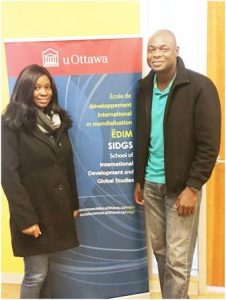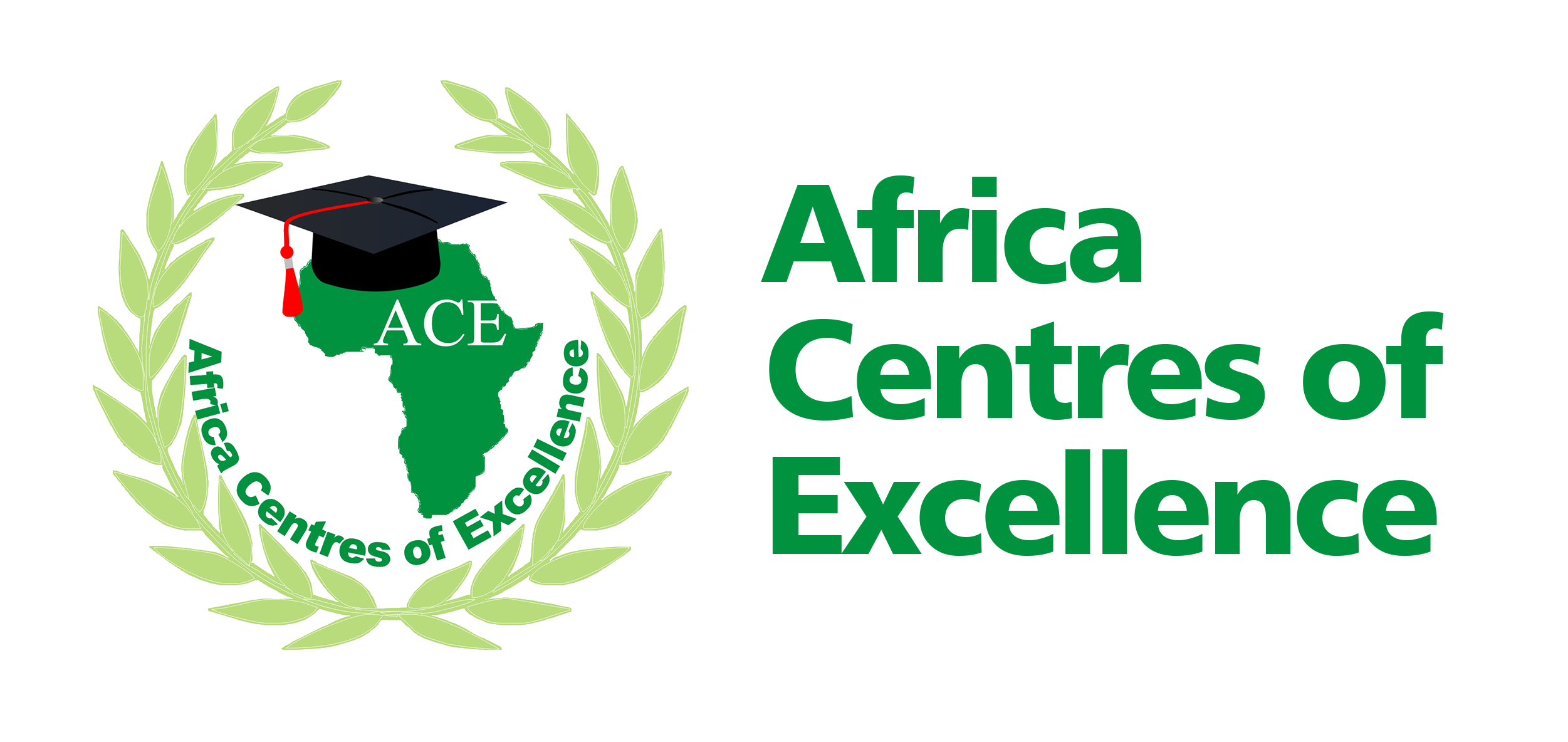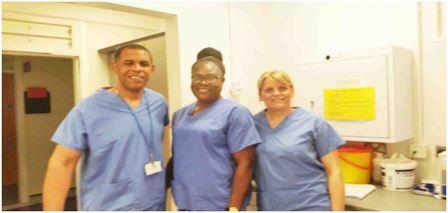In keeping with the conditions of the World Bank’s Africa Centres of Excellence (ACE) project, the University of
Benin’s Centre for Reproductive Health and Innovation (CERHI) has recorded remarkable achievements through its
partnership with local, regional and international institutions. One of such achievements is the Centre’s sponsorship of
a number of its students for all-expense paid internships, which included stipends for the students’ upkeep, facilitated
with the support of partner-institutions.
Participants were selected, based on merit and their overall performance in the course of their studies. Some of them
share their experiences during the course of their internships:
Internship at Queens University, Belfast…
By Mrs. Constance Izekor, MSc. student of Reproductive Health Nursing
My journey to Belfast commenced on Thursday, 28 April, 2017, for an internship, as part of my training as an MSc.
student in the field of Reproductive Health Nursing. The aim of the programme was to ensure that graduates are
industry-ready, to address the reproductive health challenges in the West-African sub-region.
Besides lectures, the internship exposed me to clinical experience in various hospitals such as the Royal Maternity
Hospital, Regional Fertility Centre, Lagan Valley Maternity-which is a midwife lead maternity-Marie Currie Hospice
and different simulation sections, with nurses and other medical professionals.
The posting gave me the opportunity to gain international experience as well as acquire more theoretical knowledge
and clinical skills in Reproductive Health Nursing, in line with the broad objectives of the programme in the following
areas: Micro-birth, building team spirit, the importance of selflessness among care-givers, management of
complications in obstetrics, and skills in simulation. Other skills learnt included non-pharmacologic pain management
in labour, such as delivery in the pool, tagged “pool birth” and also the use of balloon and In-vitro fertilisation (IVF),
especially in Intra-Cytoplasmic Sperm Injection (ICSI) and cryo-preservation of spermatozoa, oocytes and embryo.
All work and no play, they say, makes Jack a dull boy, so I visited the Titanic museum to see the wreckage of the
Titanic ship.
The internship programme ended on 26 May, 2017 and the relevance of the internship to my course of study cannot be
over-emphasised. My orientation towards learning and practice has changed for the best.
…University of Ottawa…
By Seremi Henrietta Ibadin, a Master’s student in Reproductive and Family Health

This Master’s programme is aimed at building the capacities of postgraduate students in research and public health
practice to enable them to contribute effectively to improving reproductive health in West Africa. Part of the
requirements of this programme was an internship in the University of Ottawa, which I carried out under the
supervision of Professor Sanni Yaya, a professor of Economics and Global Health and Director of the School of
International Development and Global Studies (SIDGS). I was specifically posted to Professor Yaya because my
research interests lay within one of his areas of expertise – maternal health research in sub-Saharan Africa.
The internship broadened my knowledge of research methodologies, it helped me develop ideas for future research
and acquire new skills, such as gaining a better understanding of the application of statistical techniques for measuring
inequity in health service utilisation and how to use STATA and Atlas Ti softwares for data analysis. I also received
feedback that improved the quality of my Master’s in Public Health (MPH) proposal from my supervisor. In addition,
interacting with other postgraduate students and faculty has expanded my academic network and laid the foundation
for future research collaborations.
Perhaps the most important insight I gained from the internship experience was a deeper appreciation of what I had
learned from the CERHI programme, which equipped me for the internship and guaranteed that I did not feel like a
‘fish out of water’ during academic discussions.
Although my internship was largely academic, visiting the city of Ottawa also gave me a cross-cultural experience. It
was refreshing to find that the city was very visitor-friendly and random strangers were always willing to assist in
small ways. I was constantly fascinated by the ease with which conversations often switched from English to French,
true to the University’s nature as the largest bilingual university in the world. Like most visitors, I took the
opportunity to tour Canada’s capital city and enjoyed a day trip to the picturesque village of Mont Tremblant in the
Laurentian Mountains.
While the internship experience was a deeply rewarding one, it was challenging trying to learn a lot in such a short
time. I found myself wishing that I had the opportunity to spend a full semester, rather than a month. I can certainly
say that I benefitted immensely from the opportunity and would recommend that the internship programme be scaled
up in the near future.
I am grateful to CERHI management for striving to provide students with a robust academic experience in the MPH
programme. I know that we may have a long way to go, but I also realise that the University of Benin is getting closer
to achieving its full academic potentials.
…MacArthur Foundation…
By Obiageli Okwara, a Master’s student of Reproductive and Family Health (Department of Community
Health)
The MacArthur Foundation is a non-governmental organisation established to support creative people, effective
institutions and influential networks, in a bid to build a more just, verdant, and peaceful world. Being one of the
largest independent foundations in the United States of America (USA), the MacArthur Foundation provides support
to several organisations working in about 50 countries all over the world. Though the Foundation’s headquarters is
located in Chicago, it has other country offices in India, Mexico and Nigeria.
I had the opportunity of undertaking my one-month internship programme with the Foundation’s Abuja office, which
happens to be the regional office for the whole of Africa, in March, 2017. As one of the pioneer interns, I looked
forward to the opportunity of gaining a hands-on experience in monitoring and evaluating donor-funded programmes,
advocacy and learning the act of proposal writing for grants. I was, however, pleasantly surprised by the wealth of
experience I gained from the internship programme.
I had the rare privilege of attending high-level closed-door advocacy meetings with top Federal Government officials
and representatives of multilateral, as well as bilateral international organisations, where decisions were made
concerning the current state and progress of maternal and child health in Nigeria. I was exposed to several trainings,
workshops and conferences, organised as part of the interventions targeted at achieving the Sustainable
Developmental Goals in Nigeria, as they relate to Reproductive and Family Health. Some of these fora were the
maiden quarterly interactive forum on effective Civil Societies (CSOs) engagement in Global Financing Facility
(GFF) in Nigeria, the Reproductive Maternal Neonatal and Child Health (RMNCH) Summit, the training of trainers
(Doctors, Midwives and Community Health Extension Workers workshop in Adamawa and Nasarawa States and the
interactive training session on qualitative research, organised by Planned Parenthood Federation of Nigeria.
I was also given the opportunity to participate in, as well as monitor and evaluate, some of the projects being
sponsored by MacArthur Foundation, such as the task shifting and task sharing policy projects in Adamawa, Niger,
Nasarawa, Gombe and Kaduna states. I also had the privilege of participating in the supervisory visits conducted
amongst various implementing partners and grant beneficiaries, such as Jhpiego Foundation, Partfinder International,
Population Council, Centre for Right to Health, IPAS, PLAN International as well as the Community Health &
Research Initiative (CHRI).
Experiences garnered during the workshops, conferences, interventions and supervisory visits have helped me bridge
the knowledge gap that previously existed in areas related to advocacy, accountability, monitoring and evaluation of
donor-funded programmes. They have also broadened my perspective about activities relating to reproductive and
family health in Nigeria, in relation to the various measures being instituted to effectively address reproductive health
challenges.
Competences gained in the course of the internship included the ability to organise trainings, workshops and
intervention programmes which will help in providing solutions to prevailing public health issues in reproductive
health as well as the ability to effectively monitor and evaluate donor-funded programmes.
My sincere gratitude goes to the MacArthur Foundation and the CERHI Management Board for making my internship
programme a truly memorable one.
…Harvard T.H. Chan School of Public Health…
Dr. Michael Ezeanochie, a Master’s student in Reproductive and Family Health (Department Obstetrics and
Gynaecology)
The MSc programme in Reproductive Health aspires to train qualified individuals to meet international standards, in
order to greatly impact on improving reproductive health policies and services. Using innovative components, such as
internships in industries, exchange programmes and applied research, CERHI better equips its students with field
experiences on Reproductive Health issues from a practical perspective.
I spent one month in the summer of 2017, on an internship at the Maternal Health Task Force, a project of the Women
and Health Initiative in the Department of Global Health and Population, Harvard T.H. Chan School of Public Health,
United States of America. The focus of the Project is to promote maternal health and end preventable maternal
mortality and morbidity, worldwide. My host was the Director of the Programme, Professor Ana Langer.
During my internship, I participated in several meetings, programme evaluation reports and other activities which
expanded my horizon on reproductive health issues. Of particular interest was the Caesarean Section Technical
meeting at the Harvard T.H. Chan School of Public Health, which had participants, some of who were leading
scholars in Maternal Health, drawn from around the globe as well as representatives of major donor agencies and
multilateral organisations. In the course of the meeting, we examined issues affecting the safety and quality of
Caesarean Section services in low resource settings and developed a consensus action agenda to improve Caesarean
Section safety and quality. A full report on this is available online at https://fistulacare.org/ resources/program-reports/
cesarean-section- technical- consultation/
I explored the opportunity provided by the internship to develop my capacity to initiate and conduct health-related
research. I acquired the prestigious CITI Program/Harvard University certification on Good Clinical Practice,
Responsible Conduct of Research, and Research Ethics for Biomedical Investigators and Conflicts of Interest in
Research. I also presented a Research Seminar on a University of Benin (TETFund-funded) project, which I had
participated in Teaching Hospital on Cervical Cancer. The seminar, titled ‘Serum Selenium Levels and Premalignant
Disease of the Cervix: A Comparative Study among a Population of Women in Nigeria’, was well received by the
audience and ideas for future research collaborations, discussed.
As part of my programme, I was expected to write an article on a contemporary challenge affecting the quality of
health care in Nigeria and innovative home-grown Nigerian solutions to it. I wrote about the shortage of skilled health
workers in Nigeria and the country’s efforts at trying to provide citizens with qualitative health services. My article,
titled ‘Providing Equitable, High Quality Maternity Care in the Context of a Limited Health Workforce: Lessons From
Nigeria’ was published on the Institute’s website and is accessible via https://www.mhtf.org/2017/09/ 29/providing-
equitable-high- quality-maternity- care-in- the- context-of- a-limited- health- workforce-lessons- from-nigeria
I am extremely grateful to the World Bank, the University of Benin and the CERHI project team for the opportunity to
undergo such an enlightening programme. I learnt a lot during the posting and I believe I am better positioned to
deliver on the mandate of CERHI.
… African Population and Health Research Centre, Kenya
By Orezimena T. Omo-Ikirodah, a Master’s student in Reproductive and Family Health (Department of
Community Health)
Several thoughts ran through my mind as the Centre Leader announced to the class that we would be going for a one-
month internship course in designated centres and I wondered what modalities would be used in determining who
would go where. As expected, questions began to arise and there was so much uncertainty in the air.
I had applied to CERHI for a Master’s in Public Health (Reproductive and Family Health), the previous year, and was
granted admission, as one of the ACE’s pioneer students. Some of my classmates and I had our doubts about the
possibility of achieving the set goals of the Project but we were determined to contribute our quota to its success.
I was billed, originally, to undergo my internship in Niger Republic but, due to a language barrier, the institution I was
posted to declined acceptance and my posting was changed to Kenya – African Population and Health Research Centre
(APHRC). My joy knew no bounds! I was billed to leave the shores of Nigeria and gain some international field
experience!
While in APHRC, I had the privilege of interacting with major stakeholders in the area of research and I built my
network. I also engaged in the actual field work to collect, manage, analyse and interprete data. I conducted focus
group discussions and was exposed to hands-on teaching sessions on statistical packages for quantitative (STATA)
and qualitative data analysis (Nvivo). I took refresher courses on Research Conceptualisation, Literature Review and
Research Ethics.
My Kenyan experience was not all about work; I took out time to visit the Giraffe Park, an experience which proved
to be the icing on the cake. My internship experiences, both academic and social, would not have been possible had I
not taken the first step of applying for the course.
I am deeply grateful for the opportunity and privilege this programme has afforded me. I must also add that the
management of CERHI deserves great credit for its efforts at ensuring that it does not fall short of the excellent
standards which the ACE project demands.

